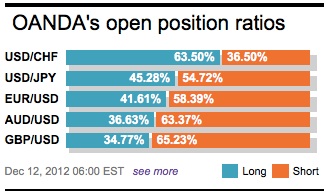It’s difficult to find a pulse, but Capital Markets still has one, as they remain calm ahead of the monetary policy announcement from the FOMC later today. After a false start and an extended deadline, Greece has completed a successful bond buy-back, allowing their borrowing costs to ease significantly. In the end, Greece attracted offers exceeding the +EUR30b quota targeted needed to retire half of its private debt to creditors. However, the high price offered to secure the deal could result in Greece requiring more money than initially planned to meet its debt reduction targets. Tomorrow the Euro-finance ministers meet to decide if they should be signing off on Greece’s next aid tranche. So far, the country has been capable of dotting all the ‘I’s.’

Currency markets remain on an even keel ahead of the conclusion of the two-day FOMC meet. Overwhelming consensus expects board members to decide on new steps to ease monetary policy to replace the existing Operation Twist (selling short securities and buying long). Opinion is divided on the size and duration of any announcement. However, many expect the FOMC statement to announce that it will be complementing its existing +$40b/month outright MBS purchases with a newly announced +$45b/month in Treasury purchases. This will keep the total purchases of long-end product unchanged after the Twist ends later this month, and the Fed stops selling front-end paper. The market is currently priced for this outcome, the disappointment, if any, will come from the Fed deciding on a smaller pace of new Treasury purchases. Amounts below the +$45b, the suggested target, could be perceived as market disappointment.
US budget talks remain on track to ‘nothing’ so far. It’s certainly the most dominant factor influencing current trading strategies. Broken rhetoric of ‘no’ deal before Christmas to striking a deal to avert the fiscal cliff continues to be heard from all quarters. Until policy makers can produce something of substance, expect rhetoric to continue to fall on deaf ears. It’s like the Euro-finance ministers meet today; they are expected to discuss the creation of a single banking supervisor. They have a self-imposed deadline of January 1 to find a compromise. The markets do not want to hear the broken records, they interested in results. So expect them to ignore most of the insignificant rhetoric.
Resilience continues in the UK labor markets, similar to what we witnessed in North America last week. Earlier this morning, the UK claimant count measure fell by -3k last month, compared to the +7k print that was expected. Despite the unemployment rate remaining steady (+7.8%), analysts note that the actual job breakdown continues to show a trend improvement (employment +40k, unemployment -82k August-October). The release confirms that the level of employment at +29.06m is the highest ever recorded. The overall print suggests that the UK is witnessing an improved labor market. With other data confirming no signs of wage inflation should combine to comfort the BoE, maybe until Carney’s arrival….eh!
Earlier this week we had Governor King at the BoE suggesting or strongly hinting at a currency war. Developing nations it seems are in a race to weaken their domestic currencies to use to get out of this dead “growth-spiral.” Last night he was joined by his commonwealth partner in crime, Governor Stevens at the RBA, who notes that aggressive easing by Japan and the US are having a spillover effect. Their actions are pushing capital towards higher-yielding currencies, like the AUD. This in effect is perceived as over valuing specific growth currencies. Initially, this type of policy was used to stimulate demand and growth, now, calling foul, its been perceived as economies relying on ‘exporting’ their currency weakness. The market should expect the ‘currency war’ theme to get significant airtime in 2013.
It was no surprise to witness the Euro bloc IP falling in October (-1.4%), again suggesting that the regions economic downturn was well entrenched heading in Q4. Beating expectations confirms that the shallow recession already witnessed in Q1 and 2 is probably about to deepen this quarter. It certainly casts doubts on the region posting anything positive anytime soon. Weakening economies make it difficult for governments to cut their debt loads, as falling receipts tend to lead to higher public borrowing and higher servicing of debts.

It’s beginning to look like the EUR’s low last Friday was the base. Technical analysts are beginning to wonder if its safe to announce that the daily single currency charts are oversold. For now, many should expect the most prudent strategy to take into consideration yesterday’s positive close. If so, investors would probably lean towards buying EUR outright on dips, despite the market’s bias being skewed towards the downside.

Other Links:
Negative EURO Pundits Have to Wait
This article is for general information purposes only. It is not investment advice or a solution to buy or sell securities. Opinions are the authors; not necessarily that of OANDA Corporation or any of its affiliates, subsidiaries, officers or directors. Leveraged trading is high risk and not suitable for all. You could lose all of your deposited funds.


